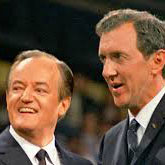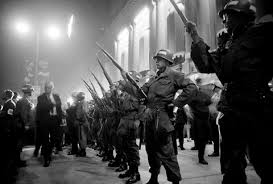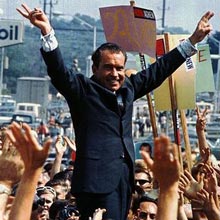Catch-up from previous post
 The 1968 Democratic Convention in Chicago is now underway. Eugene McCarthy and Robert Kennedy (now assassinated), the peace candidates, have won a huge majority of the popular vote. President Johnson has dropped out and Vice President Humphrey and Ed Muskie are the party-establishment’s choice. More than 10,000 demonstrators have shown up to protest the inevitable, and face 28,000 police, national guards and federal troops. (see previous post)
The 1968 Democratic Convention in Chicago is now underway. Eugene McCarthy and Robert Kennedy (now assassinated), the peace candidates, have won a huge majority of the popular vote. President Johnson has dropped out and Vice President Humphrey and Ed Muskie are the party-establishment’s choice. More than 10,000 demonstrators have shown up to protest the inevitable, and face 28,000 police, national guards and federal troops. (see previous post)
The Worst Day – for Protesters
According to CNN, “The worst day of protesting was Wednesday, Aug 28, and was dubbed the “Battle of Michigan Avenue.” Protesters were stopped in their march to the convention site and the media recorded graphic violence on the part of the Chicago police.

Many innocent bystanders, reporters and doctors offering medical help were severely beaten by the police.” The police assault in front of the Hilton Hotel that evening became the most famous image of the Chicago demonstrations. The entire event took place live under the TV lights for seventeen minutes with the crowd chanting, “The whole world is watching.”
Inside the convention hall tensions ran high. When Dan Rather tried to interview a delegate being evicted, he “got violently pushed out of the way” by the police and “belted in the stomach,” at which point he was interviewed on-air by Walter Cronkite, who ended the interview saying “I think we’ve got a bunch of thugs here, Dan.” When Senator Ribicoff nominated George McGovern, he remarked “And, with George McGovern as President of the United States, we wouldn’t have to have Gestapo tactics in the streets of Chicago!”
The focus of contention was the “peace plank” of the Democratic platform. Debate was limited to one hour for each side. Rep. Phil Burton (D-CA) spoke in support of the peace plank, Sen. Ed Muskie (D-ME) spoke in support of the Johnson-Humphrey language. After the Humphrey language was approved, the New York and California delegations began to sing “We Shall Overcome” and more delegations marched around the convention floor in protest. Television made it impossible for the convention planners to hide the protests of delegates favoring the peace plank.
The Real Worst Day, November 5th
On October 31, Johnson called a halt to the bombing in an attempt to start the peace talks. But Nixon and the Republicans had been in regular contact with (Republican) Anna Chennault, in Vietnam, who advised the Vietnamese government not to attend the Paris peace talks, thereby preventing the truce Johnson had hoped for. (Johnson knew this from a wire tap.)
 On November 5, Richard Nixon won the popular vote by just 0.7%, and he continued the war through his first term and beyond.
On November 5, Richard Nixon won the popular vote by just 0.7%, and he continued the war through his first term and beyond.
But November 5 was worse than it sounds. While Johnson won in 1964 with 61% of the vote, Humphrey got only 43%. Nixon took about 5% of the lost votes and George Wallace, the Southern segregationist, took about 13%. So the largest impact on the race was surely Johnson’s Civil Rights work. But given such a narrow Republican victory, the bad press from the Chicago convention may well have tipped the balance. This is not to place the blame on the peace movement and Yippies; the Democratic establishment behaved far worse.
But the peace movement would have had a much better chance had McCarthy yielded to the far-more electable Bobby Kennedy instead of engaging in viscous infighting. Ironically, had McCarthy done this, he would have ended up with all of Kennedy’s delegates at the convention, and there would likely have been more in total. And while Yippie antics appealed to many of us, even then we had a good idea that they were not winning over the American public, quite the opposite. The result may well have been thousands more Americans killed in Vietnam and tens of thousands more Vietnamese dead.
But the vast bulk of the peace movement consisted of completely peaceful, well-meaning Americans, old as well as young, who were absolutely right about the moral bankruptcy of the war. So my point is not to condemn them for failing, but to suggest the importance of learning from our past mistakes.
The establishment is more powerful than you think (present “socialists” included). And change requires far more than passionate commitment to “the good fight.” You need strategy. As Teddy Roosevelt said, Speak softly, but carry a big stick”. Back in the sixties we yelled a lot and had no stick at all.
Post Script
And just as a reminder of the magnitude of grievances driving the start of this would-be political revolution, 2,709,918 Americans served in Vietnam (many of them drafted), and 58,220 of them died there. An estimated two million Vietnamese were killed. We dropped 2,756,941 tons of bombs on Cambodia, slightly more than were dropped by the Allies in the European theater during World War II. All that and a few decades later, President George W. Bush was visiting Vietnam and toasting its president.

